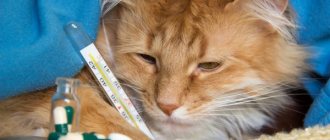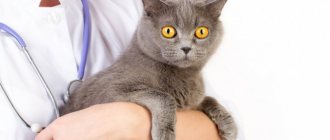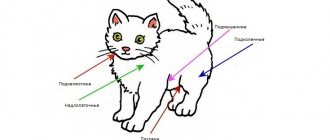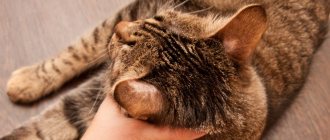Unfortunately, cats are susceptible to the same diseases as humans. Various allergic reactions of animals are considered to be quite common; they can occur to anything: bites of fleas, mosquitoes, wasps, house dust, pollen of house plants, chemicals, medicines. Food allergies in cats are also common, which bothers our pets and occurs due to food. In our article we will tell you how to recognize a food allergy, consider the most common symptoms, and tell you what principles should be followed when selecting food.
Causes leading to allergies
There are many reasons leading to the development of food allergies:
- The negative environmental situation not only affects the health of people, but also animals.
- Poor quality food. Very often, cheap types of food purchased from dubious places can lead to a similar reaction in the body.
- Infection with helminths undermines the body's vital processes and can lead to allergies.
- Intestinal infections can cause a similar illness in an animal.
- Frequent illnesses can lead to a decrease in immunity and the occurrence of an allergic reaction in the form of inability to digest foods.
- If a cat has had all kinds of allergic reactions in its family, then the cat has every chance of acquiring this problem.
How to find out what causes cat food allergies
It is very difficult to find out which allergen causes such a reaction. Even more difficult is to remove it from the diet. Therefore, the best option would be to go to a specialist in the clinic as soon as symptoms are identified.
You should not self-medicate, because symptoms similar to food allergies appear in atopic dermatitis and some other diseases.
To determine which product your pet is allergic to, an elimination diet is used. All nutritional components in it are replaced with hypoallergenic ones, and special food is purchased. As soon as the allergy symptoms go away, the diet is changed to a provoking one - elements are introduced one at a time and the body's reaction is monitored. This is a very time-consuming detection method, but, alas, there is no other method.
It is very important to carefully monitor that during these diets the cat does not receive additional nutrition, which can confuse the clinical picture.
What foods most often cause allergies?
Veterinarians have found that there are certain foods that most often cause an allergic reaction. Most often the reaction occurs to:
- Chicken.
- Wheat.
- Eggs.
- Beef.
- Fish.
- Dairy products.
All cats are big fans of dairy products and fish, but many veterinarians say that these products are contraindicated for them. Moreover, allergies can occur to both natural and dry food containing similar ingredients.
To eliminate food allergies, you need to identify the product included in the animal’s food that causes the main problems.
Is my cat food sensitive?
If your cat vomits frequently, has diarrhea, skin irritation, poor hair condition or excessive hair loss, these may be signs of a food allergy. The most common symptoms of a food allergy or food intolerance are digestive disorders and skin irritation. If your cat has developed a food allergy or food intolerance, you may observe the following symptoms:
- vomiting or diarrhea,
- flatulence,
- frequent scratching or hair loss,
- redness and inflammation of the skin,
- chronic ear problems,
- slow growth in kittens,
- coughing, sniffling and sneezing.
IMPORTANT: Some symptoms of food allergies or food intolerances are similar to those of other serious conditions, so consult your veterinarian if you notice any of them.
Symptoms of food allergies
Listed below are the most common symptoms that cats experience when they develop an allergic reaction to food. Moreover, the better the owner remembers and lists the signs that appeared in the cat, the more correct the animal’s treatment will be prescribed, for example:
- Itching that appears regardless of the seasonal manifestations of allergies.
- There is no positive reaction to the use of hormonal medications in the form of improvement in the cat's condition.
- Vomit.
- Diarrhea.
- Bloating and fermentation in the stomach.
- Ear infection.
- Dermatitis, skin scratching.
- Redness on the skin of the animal.
- Increased hair loss, appearance of bald spots.
- Ulcers caused by scratching the skin.
- Darkening of the skin.
- Inflamed and purulent blisters.
Allergy to food or food intolerance: how to distinguish between these pathologies
Food intolerance and food allergy are often confused because both pathologies are caused by the animal's diet. However, it is important to distinguish between them, because the future health of the animal depends on the correct treatment.
With allergies, the main symptoms occur on the pet's skin, while with food intolerance, problems with the gastrointestinal tract are observed. Food intolerance does not appear from the allergenicity of the product, but most often from its quantity. With this disease, the body simply cannot digest certain foods because it does not have the necessary enzymes.
How to check which food component causes an allergic reaction
In order to carry out the treatment as effectively as possible, it is very important to exclude the ingredient that gives the animal an allergy. To do this, you need to identify this component, and this is a rather difficult procedure. Allergy treatment will not give a positive result if the cat regularly consumes food that causes a reaction in the body.
The principle of the test is that the animal is transferred to a new type of food for 3 months. At this time, the cat must have a strict diet, that is, the consumption of sweets, any flavorings, and medications must be excluded; the animal must consume only the selected food and water. After 3 months, you can accurately say whether the cat has an allergic reaction to this type of food.
Some cats have an allergic reaction to a new type of food immediately after consumption, while in others it may take several months.
Types of allergies
Food allergies in cats
A food allergy is an increased reaction of the body (i.e. hypersensitivity) to a certain product. Manifestations of food allergies in cats are varied and may include itching, skin rashes of varying intensity and diseases of the gastrointestinal tract (manifested by vomiting and/or loose stools).
If a cat has itching or dermatitis, most owners first suspect a food allergy, but this is not the case: only 5% of all cat diseases and 10-15% of cases of itching are caused by a reaction to food.
Photos of allergies in cats
It should be noted that laboratory methods for diagnosing this type of allergy are not effective. The main diagnostic tool is still an elimination diet. When feeding at home, 2 types of food are selected that the cat has never eaten before: one type of protein (for example, rabbit meat) and one type of carbohydrate (for example, boiled potatoes). All other products are excluded, including vitamin supplements.
When feeding with industrial feeds, preference is given to diets based on protein hydrolyzate (in such feeds, when preparing the feed, protein molecules are specially broken down into shorter chains of amino acids, and it is believed that due to their size they cannot cause food allergies) or feeds based on new for a cat, a type of protein (for example, horse meat). The duration of the diet is from 4 to 8 weeks, depending on the effect: if the condition does not change or even worsens during the diet, then 4 weeks is sufficient; if the condition improves, but smoothly and slowly, the period is 8 weeks. The principle of this test is that if there is no effect on the background of an elimination diet, the assumption is made that the pet’s allergy is not of a food nature. And if the diet helped, in order to confirm that the improvement is associated precisely with a change in food, and was not a coincidence, they must carry out a so-called provocation - they return the cat’s usual diet to the cat’s diet. If signs of allergies appear again, it means your pet definitely has a food allergy. If there is no deterioration in the condition, the problem was not in the food.
List of products that may cause allergies:
- dairy products, especially cheese;
- eggs;
- flour products;
- products containing sugar;
- beef;
- corn;
- chicken;
- wheat;
- fish;
- mutton.
Allergic reaction to insect bites
Despite the fact that a large percentage of domestic cats live indoors and never go outside, an allergic reaction to insect bites is still a common cause of allergies in cats. Not only fleas can parasitize cats in an apartment, but also smaller parasites that can only be seen under a microscope - for example, scabies mites (notoedrosis). When bitten by a parasite, some pets develop an allergic reaction to its saliva.
The most striking symptoms of the presence of parasites in a cat include restless behavior, itching, cats constantly wash themselves, lick themselves, and even go bald. Dermatitis of varying severity often develops. Confirming the diagnosis using laboratory methods can be quite difficult, given the microscopic size of some parasites, so the most effective measure for making a diagnosis is trial treatment, that is, treating the pet and the environment from parasites.
Atopic dermatitis
Atopic dermatitis is a chronic allergic inflammation of the skin due to exposure to any airborne allergens. Such allergies can be caused by plant pollen, fungal spores, dust, any household chemicals, tobacco smoke, etc. Environmental temperature, air humidity, as well as the presence of concomitant diseases (flea infestation, food allergies) play an important role in the development of atopic dermatitis. It is believed that the tendency to develop atopic dermatitis is hereditary.
The diagnosis is quite difficult; This is a disease of exclusion, that is, the presence of atopic dermatitis is confirmed only when all other causes of itching and dermatitis are excluded.
Hurry up, choose a box and find out what gift awaits you
Discount on pet insurance
Promo code copied to clipboard
Treatment
When an animal has a component that causes a reaction in the body, then, first of all, it is necessary to completely exclude it from consumption. The treatment procedure includes:
- The cat is treated with antihistamines.
- Hormonal drugs are often prescribed to help relieve a critical situation.
- Eating specially formulated hypoallergenic food will help avoid repeated incidents.
- To treat allergies, you need to strictly monitor new foods you eat. To do this, if the symptoms of this disease are not noticed when consuming a certain type of food, a new ingredient is gradually added. For example, if two weeks after adding chicken, the animal feels fine, then you can try adding potatoes. When, after starting to eat potatoes, signs of the disease appear, we can conclude that the potato causes a reaction in the body. This way you can check how the cat tolerates certain products.
- Allergy treatment involves testing for the presence of worms. If parasites are found in a cat, then anthelmintic measures will need to be taken.
- Vaccinations help your pet avoid all kinds of diseases, and thereby strengthen the pet’s immunity.
If a cat has a severe allergic reaction to ready-made food, then you should think about switching it to food prepared with your own hands.
In the modern world, allergies are the most common disease, occurring not only in humans, but also in cats. If you have a negative reaction to cat food, you need to eat hypoallergenic food that will help the animal live comfortably with such a difficult disease. At the same time, the quality of life of the mustachioed pet does not change at all.
Allergy symptoms in cats
The most common symptoms and signs of allergies in cats include:
- dermatitis (inflamed areas of the skin);
- itching;
- restless behavior;
- eating disorders.
Unfortunately, based on how allergies manifest themselves in cats, it is impossible to conclude whether the reaction occurred to food, to an airborne allergen, or to household chemicals - the symptoms for different types of allergies are the same.
Allergy treatment
An allergic reaction in a cat is usually treated at home, but after examination by a veterinarian. It is this specialist who must determine the cause of the allergy and tell you how and with what to treat your pet.
Treatment of a cat must be carried out comprehensively. If the cause of a specific reaction in your pet’s body is flea bites, you need to immediately remove these parasites. The doctor can recommend effective, safe medications (Advantage, Stronghold, anti-flea shampoos). Wearing a special collar will help maintain the effect after eliminating fleas. For severe itching and swelling, the veterinarian may prescribe a course of antihistamines and corticosteroid medications.
If there is swelling of the paw pads, eczema, or peeling, the doctor can diagnose an allergy to cat litter. In this case, you must definitely change this remedy. It is recommended to choose a filler without small particles or odor. You can also change the brand and type of filler.
Antihistamines may be prescribed:
- Hydroxyzine;
- Diphenhydramine;
- Pipolzin;
- Tavegil;
- Chlorpheniramine;
- Diphenhydramine;
- Clemastine.
Treatments for food allergies
There is no specific test to determine food allergens in cats. Therefore, treatment of allergies caused by food begins with a diet based on the elimination method. Your cat should include only hypoallergenic foods on the menu:
- rabbit;
- lamb;
- barley;
- rice;
- salmon;
- veterinary dietary feeds.
This diet must be followed very strictly. A pet should not accept even the slightest treat from anyone. It is recommended to keep a special journal in which you should write down the menu for the day, the amount of food, and the animal’s reaction to food.
If the signs of food allergy completely disappear, they move on to the second step - a provoking diet. It consists of introducing one component and monitoring the pet’s reaction. In the absence of a specific reaction, another possible allergen is introduced. If the allergy recurs, you will be able to pinpoint the allergen and remove it from your pet’s diet forever.
Allergic reaction to chicken
Very often, cats develop an allergy to chicken. This is explained by the fact that this ingredient is used in the manufacture of many pet foods. Once you have diagnosed an allergic reaction, it is very important to change your pet’s diet. If the cat eats natural food, you simply exclude chicken from the menu.
If you give your cat special food, choose the treat carefully. You can try giving him Orijen (with fish), Hills, Proplan (with lamb, fish). There are also special foods made specifically for allergy sufferers. They do not contain any components that provoke an allergic reaction in cats.
Allergy medications
Since certain substances that cause allergic symptoms cannot be completely removed from the environment, the following medications may be recommended:
- steroids, or other immunosuppressants (cyclosporine)
- Antihistamines can be used, but they are rarely effective once significant clinical symptoms have developed and are best used as a preventive measure
- Dietary fatty acid (omega three) supplements may help reduce itching
- shampoos that can prevent skin infections commonly seen in cats with allergies
- flea prevention products that can be used monthly
By using these medications, you can significantly improve the quality of life of a cat with allergies.
(c) Veterinary center for the treatment and rehabilitation of animals “Zoostatus”. Varshavskoe highway, 125 building 1. tel.
8 (499) 372-27-37










